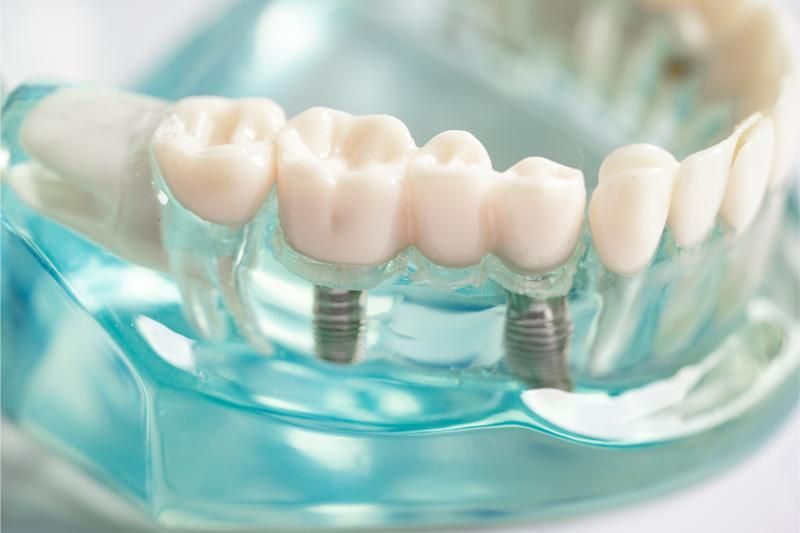Tooth Implant Pros and Cons: What You Need to Know Before Deciding

Deciding whether tooth implants are right for you? This article explores the pros and cons of tooth implants, offering a balanced view to help you make an informed choice.
Key Takeaways
- Dental implants provide a natural look, long-term durability, and improved oral function, making them a popular choice for tooth replacement.
- The high initial cost, surgical requirements, and potential complications are significant factors to consider when deciding on dental implants.
- A thorough health assessment and good oral hygiene are crucial for the success and longevity of dental implants.
Tooth Implant Pros and Cons: What You Need to Know Before Deciding

Dental implants are often heralded as the best long-term solution to replace missing teeth, offering durability and a natural look and feel. However, like any significant medical decision, they come with their own set of pros and cons. Understanding these can help you make an informed choice that aligns with your oral health needs and lifestyle.
Examining both the benefits and potential drawbacks of dental implants helps you weigh your options and determine if they are the right choice for you.
Introduction
Dental implants play a crucial role in replacing missing teeth and enhancing oral health. Before opting for this tooth replacement, understanding the various advantages and disadvantages associated with dental implants is crucial.
This blog post provides a comprehensive overview of these factors, helping you make an informed decision.
Advantages of Tooth Implants

Dental implants offer a myriad of benefits that go beyond just filling gaps in your smile. They restore oral function, prevent bone loss, and are easy to maintain, making them a preferred choice for many in the field of implant dentistry.
These advantages highlight why many people consider dental implants the best option for replacing missing teeth.
Natural Look and Feel
One of the most appealing aspects of dental implants is how closely they resemble and feel like a natural tooth. They can be customized to match the color and shape of your natural teeth, making them virtually indistinguishable from the originals. Additionally, dental implants are firmly anchored into the jawbone, offering a stable and secure fit that feels like real teeth.
Unlike dentures, which may slip or make clicking sounds, dental implants offer a seamless and natural experience.
Long-Term Durability
With proper care, dental implants can last a lifetime, presenting a highly durable solution for missing teeth. Typically made from titanium, a material known for its strength and biocompatibility, dental implants are designed to withstand the test of time.
This durability means once you invest in dental implants, you enjoy a stable, permanent solution without frequent replacements.
Improved Oral Function
Dental implants mimic natural teeth closely, allowing unrestricted eating and chewing. Unlike other tooth replacements, dental implants restore full bite force, enabling a normal diet and a variety of foods. This improved oral function can significantly enhance your quality of life, making eating enjoyable once again.
Prevention of Bone Loss
A critical benefit of dental implants is their ability to prevent bone loss dental implants. When a tooth is lost, the bone around the missing tooth can break down and disintegrate.
Dental implants anchor into the jaw like real teeth, stimulating bone growth and maintaining jaw strength. This process, known as osseointegration, preserves jawbone density by mimicking the natural function of tooth roots, ensuring jaw strength and health.
Easy Maintenance
Caring for dental implants is straightforward and similar to maintaining natural teeth. Routine brushing and flossing are all it takes to keep your implants in good condition. Unlike dentures that require special cleaning solutions and adhesives, this ease of maintenance makes dental implants a convenient and hassle-free option.
Disadvantages of Tooth Implants

While dental implants offer numerous benefits, the cons of dental implants also come with certain drawbacks that need to be considered. These include high initial costs, the necessity of surgical procedures, and the fact that they may not be suitable for everyone. Recognizing these disadvantages helps you make a balanced decision and prepare for potential challenges during the implant process.
High Initial Cost
The upfront expenses of dental implants can be significant, often ranging from $3,000 to $7,000 for a single implant. This cost includes surgery, materials, and follow-up care, making financial planning imperative. Patients should explore various financing options, such as payment plans and dental insurance, to manage the costs of dental implants. Compared to other tooth replacements, dental implants are generally more expensive, potentially deterring some individuals.
Surgical Procedure Required
The process of getting dental implants involves a surgical procedure, which comes with its own set of risks and complexities. Placing dental implants surgically requires careful planning and execution, often involving local anesthesia and an incision in the gums. Potential risks include infections and nerve damage, underscoring the importance of understanding the implications of implant surgery.
Not Suitable for Everyone
Dental implants aren’t suitable for everyone, making individual health assessments crucial before considering the procedure. Factors such as significant bone loss or inadequate jawbone density can severely impact the success of a dental implant. In some cases, additional procedures like bone grafting may be necessary to prepare the jaw for implants, increasing complexity and cost.
Lengthy Treatment Process
The dental implant procedure can span several months from start to finish, involving multiple stages and healing periods. This lengthy process includes initial consultation, surgery, healing, and final placement of the implant, requiring patient patience and commitment. The extended timeline can be a drawback for those seeking a quick solution to their tooth loss.
Potential Complications
While dental implants have a high success rate exceeding 97% over ten years, potential complications can still arise. Complications may include dental implant failure, gum disease, and issues related to poor oral hygiene.
Maintaining a regular oral hygiene routine and attending dental checkups are crucial for reducing complications and ensuring long-term implant success.
Factors to Consider Before Getting Dental Implants

Before deciding on dental implants, several factors need to be considered to ensure the procedure’s success. Factors include overall health assessment, lifestyle and habits, and financial planning. Evaluating these factors can help you determine whether dental implants are the right choice for you and prepare you for the journey ahead.
Overall Health Assessment
A thorough health assessment is crucial before considering dental implants. Consulting a dentist evaluates your overall health, including jawbone density and gum condition. The initial consultation determines if dental implants are suitable and lays the groundwork for a personalized treatment plan.
Lifestyle and Habits
Your lifestyle and habits play a significant role in the success of dental implants. Health conditions like diabetes can hinder recovery and affect the procedure’s outcome, making a thorough health evaluation essential.
Good oral hygiene and healthy lifestyle choices, such as quitting smoking and following a healthy diet, are vital for ensuring dental implant longevity and success.
Financial Planning
Financial planning is crucial when considering dental implants due to their high initial costs. Investigating dental insurance coverage can help manage the costs of dental implants and related procedures. Reviewing your dental insurance benefits provides insights into the covered portion of implant costs, helping avoid unexpected expenses.
The Dental Implant Procedure Explained

The dental implant procedure is a complex process that involves multiple stages, from the initial consultation to the final placement of the prosthetic tooth. Understanding each step of the procedure prepares you for the commitment involved and sets realistic expectations for the treatment.
This section guides you through the entire process, ensuring you are well-informed before undergoing dental implant surgery.
Initial Consultation
The initial consultation is the first step in the dental implant process. During this phase, a thorough health assessment is conducted, including checking bone health and discussing your medical history. The dentist evaluates your oral health, including gum and teeth condition, to determine your candidacy for dental implants.
Information gathered during this consultation is used to create a personalized treatment plan tailored to your needs.
Surgical Placement
Surgical placement involves local anesthesia and making an incision in the gums to expose the jawbone. The implant is then placed into the bone, serving as the anchor for the artificial tooth. In some cases, general anesthesia may be required for multiple implants or extractions.
Dental implant procedures have a high success rate, with a survival rate exceeding 97% over ten years.
Healing and Osseointegration
After surgical placement, the healing process begins, which is crucial for the implant’s success. Osseointegration is the process where the jawbone grows into and fuses with the implant, providing a stable foundation for the artificial tooth.
Placing the Abutment and Crown
The final stage involves placing the abutment and crown. Once osseointegration is complete, a minor surgery attaches the abutment, connecting the crown to the implant.
The prosthetic tooth or crown is then placed on the abutment, completing the restoration and providing a fully functional and aesthetically pleasing replacement teeth for the missing tooth.
Maintaining Your Dental Implants
Proper maintenance is crucial for the longevity and effectiveness of dental implants. Like natural teeth, dental implants require daily care and regular checkups to ensure they remain in good condition.
This section provides tips on maintaining your dental implants, ensuring they serve you well for years to come.
Daily Oral Hygiene
Good oral hygiene is crucial for the longevity and success of dental implants. Here are some tips to maintain your dental implants:
- Use a soft-bristle brush and low-abrasive toothpaste to effectively clean the implants without causing damage.
- Regular brushing and flossing, like with natural teeth, help prevent oral health problems such as gum disease and tooth decay.
- Ensure your dental implants remain in top condition by maintaining a consistent oral hygiene routine.
By following these guidelines, you can help ensure the longevity and success of your dental implants.
Regular Dental Checkups
Regular dental checkups are essential for monitoring the health of your implants and surrounding tissues. Check-ups every six months are recommended to catch potential issues early and ensure implant longevity.
These routine visits allow the dentist to assess the condition of your implants and address any oral health issues that may arise.
Healthy Lifestyle Choices
A healthy lifestyle benefits the overall health of your dental implants. A balanced diet low in sugars and acids supports the health of your implants and surrounding teeth.
Avoiding harmful habits such as smoking and consuming sugary foods helps maintain your dental implants and prevent complications.
Summary
In summary, dental implants offer a durable and aesthetically pleasing solution for replacing missing teeth, with numerous benefits such as a natural look and feel, long-term durability, improved oral function, and the prevention of bone loss. However, they also come with certain disadvantages, including high initial costs, the necessity of surgical procedures, and potential complications. Before deciding on dental implants, it’s essential to consider factors such as your overall health, lifestyle, and financial planning. Remember, the journey to a healthy and beautiful smile is a commitment, but with the right care and consideration, the results can be truly transformative.

Frequently Asked Questions
What are the main benefits of dental implants?
Dental implants provide a natural appearance and feel while ensuring long-term durability and enhanced oral function. Additionally, they help prevent bone loss, making them a beneficial choice for tooth replacement.
How much do dental implants typically cost?
Dental implants typically cost between $3,000 and $7,000 each, which includes surgery, materials, and follow-up care. It's essential to consider these factors when budgeting for dental implant procedures.
Are dental implants suitable for everyone?
Dental implants are not suitable for everyone; factors like overall health, jawbone density, and lifestyle habits significantly influence candidacy. It’s essential to consult a dental professional to evaluate individual suitability.
What does the dental implant procedure involve?
The dental implant procedure involves several key stages: an initial consultation, the surgical placement of the implant, a healing period for osseointegration, and finally, the attachment of an abutment and crown. This structured approach ensures proper function and aesthetics.
How should I maintain my dental implants?
To maintain your dental implants effectively, prioritize daily oral hygiene, schedule regular dental checkups, and embrace a healthy lifestyle, including a balanced diet and avoiding harmful habits. This approach ensures the longevity and health of your implants.







